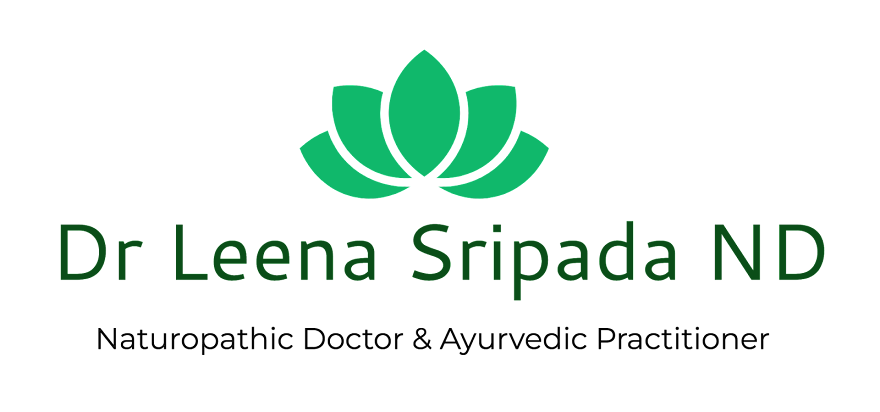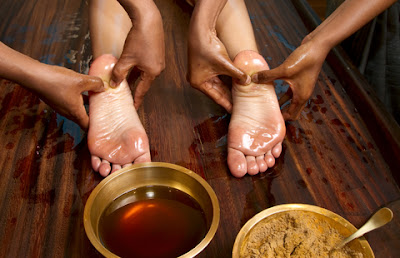 Ayurveda
is an ancient system of medicine which originated in India over 5,000 years ago
and examines the interplay of the five elements and doshas (vata, pitta,
kapha) that make up our unique constitution.
Ayurveda
is an ancient system of medicine which originated in India over 5,000 years ago
and examines the interplay of the five elements and doshas (vata, pitta,
kapha) that make up our unique constitution.
Everyone
is unique – we are each born with a different constitution on the physical
level as well as the mental & emotional level. At the core of Ayurvedic
philosophy, there are 3 vital bio-energies that make up our constitution: vata,
pitta, kapha. Each of these are made up of a combination of the 5 elements.
Summary of Doshas and their Qualities:
Vata: (air + ether) dry, cold, light, moving, changeable, subtle, rough, quick
Vata’s
function is movement. Vata types are active and mobile, often rapid and
multi-task.
Pitta: (fire + water) hot, light,
intense, penetrating, pungent, sharp, acidic
Pitta’s
function is transformation. It controls
digestion and metabolism. Pitta types
have a fiery nature in both body and mind.
Kapha: (water + earth) heavy, slow,
steady, solid, cold, soft, oily
Kapha's function is structure – holding the cells together and promoting growth.
Kapha types
are cool, steady and easily attached.
Vata Dosha - keeping the balance
Keeping
the 3 doshas balanced within ourselves is vital in staying healthy and keeping
the immune system strong. For each
individual, the balance point of vata, pitta, kapha is unique – one dosha may
be dominant over the others or two doshas may be dominant. Understanding our dominant dosha type and
learning how to prevent it from getting aggravated is key in staying healthy.
As we
prepare for fall, it is important to understand the change of the seasons and how
it impacts our health. Fall is
considered vata season because the
qualities that characterize vata are
dominant at this time of the year. The weather changes are apparent with
colder and shorter days, dry wind, lightness in the air and crackling leaves.
For
individuals with a balanced vata dosha
they may be active, creative, and stay healthy when in balance. However, when vata accumulates in the body and mind,
the imbalance may manifest as dry skin, brittle nails, joint concerns, anxiety
and nervous system issues, constipation, digestive concerns and more. Though all individuals are susceptible to the
changes brought on by fall, individuals who are vata dominant are especially at risk for vata aggravation. To help maintain balance during the fall season
and keep vata pacified, incorporating daily lifestyle routines and eating
according to your constitution can ease the transition into the cold
season.
General suggestions to reduce Vata in fall:
- Dress warm and avoid cold drafts
- Drink warm liquids: herbal teas, soups and nourishing broths that are balancing
- Incorporate warming spices into your meals such as ginger, black pepper, mustard seed, cinnamon, clove which can support blood circulation and immunity.
- Root vegetables and seasonal vegetables can be grounding such as carrots, beets, pumpkin, yams etc.
- Ensure adequate rest: more sleep is often needed at this time of year
- Meditate and take the time for relaxing activities
- Add ghee (clarified butter) or healthy oils on your vegetables or grains
- To bring stability, try to establish regularity & routine: eating, sleeping, waking up at the same time daily
- Abhyanga – oil massage which you can do on your own or have done by a qualified practioner

When we understand our ayurvedic constitution better we can do the necessary groundwork to prepare ourselves better for fall. Nourishing our body, mind & spirit is essential so we can feel great this fall & winter !
If you would like a comprehensive healthcare plan which includes understanding your Ayurvedic constitution, you can book an appointment with Dr. Leena Athparia ND or visit her website at www.doctorleena.ca
Downtown: Yuri's Village - 663 Greenwood Ave, Toronto
Markham: Naturopathic Foundations - 33 The Bridal Trail, Markham, ON
Markham: Naturopathic Foundations - 33 The Bridal Trail, Markham, ON

